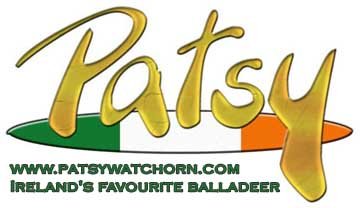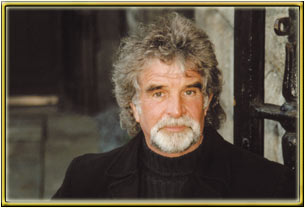|
Back To The Roots
Newcastle upon Tyne, 19th
March 2010
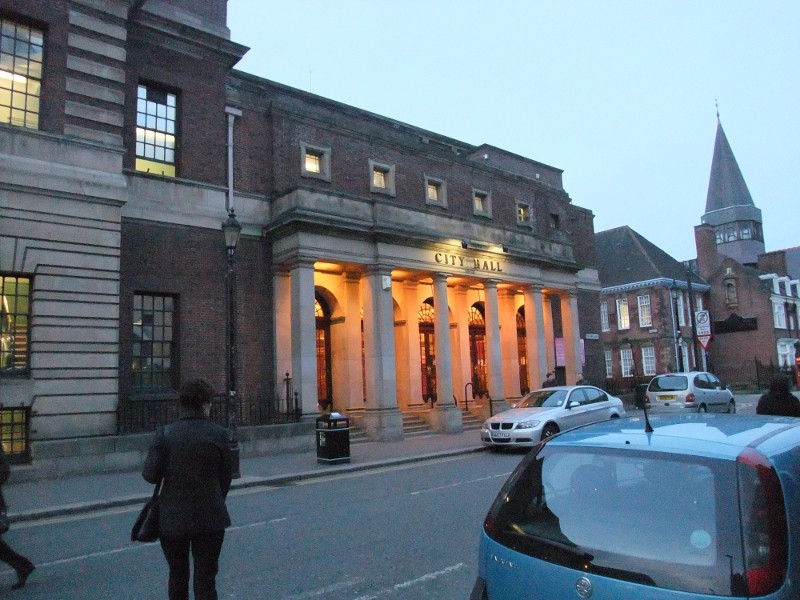
A
folk club somewhere in England, early 1960. A 19-year-old, red-haired
Irish lad, still in search of his place in the world in general and his
musical direction in particular, decides to drop in out of curiosity one
night. He has already developed in his young life a deep interest in music,
but up to now it has been the big band sound and most recently jazz music
that has absorbed him. But as our Irish teenager enters the venue this
night, the first music he hears, sung in harmony and with such obvious
enthusiasm by the mostly English visitors, is the chorus of Brendan
Behan's "The Auld Triangle". He is fascinated, immensely
impressed and deeply moved by what he sees and hears, at this moment and
in the course of the evening. From this night on his musical interest,
indeed his raison d'ętre, is redefined. From this night on he lives and
breathes folk music. What follows is history – a couple of years and
places later he returns to Ireland to become in his short but turbulent
life one of the greatest and most admired and loved musicians the folk
scene world has ever known.

That
folk club was in Newcastle, the "Folk Song and Ballad", in the
Barras Bridge Hotel, because of its rather rough interior affectionately
known by the locals as "The Sink". It opened its doors for the
first time in 1958 after two young local musicians, Johnny Handle and
Louis Killen, were encouraged to start a once-a-week folk song evening.
They had met while the former was doing skiffle and blues interval spots
in the nearby "New Orleans Jazz Club" and, to the increasing
enthusiasm of the visitors, had begun to perform there regularly as a duo.
These were the very beginnings of the folk scene in Newcastle, and only a
few months later the two talented musicians transferred their weekly folk
night from the jazz club venue to that small upstairs room in "The
Sink" which was to be the home of the "Folk Song and Ballad"
for its first years. Guest performers were engaged, but also an increasing
number of local singers and musicians appeared regularly. It was a special
Irish night that evening in early 1960, with guest musicians piccolo
player John Doonan and friends. Witnesses recall that Luke Kelly visited
the club with John Reavey, who had become one of the resident singers
there and with whom Luke later left Newcastle to seek his fortune in
Birmingham. Johnny Handle remembers: "At that time the troubles in
Ireland had not escalated and there were quite a few rebel songs sung, in
rather a jolly way." It
is said that at the close of the evening Luke alone rose to his feet as
the Irish National Anthem was played.
City
redevelopment projects made it necessary a few years later to look for new
premises for the "Folk Song and Ballad". "The Sink"
was to be demolished to make way for the new Civic Centre, and after a
short stay in rooms in Pilgrim Street the club found its final home in
1962 in the Bridge Hotel, opposite the Castle Keep and only a stone's
throw away from the High Level Bridge which spans the River Tyne. Its name
was altered several years later to simply "Bridge Folk Club",
and in the meantime it prizes itself on being one of the oldest existing
folk clubs in England. Not only for the two founder members has it been a
career stepping stone, it was here of course that Johnny Handle's own
great "High Level Ranters" came to birth in the late 60's, and
over the years many other familiar names in the folk world have passed
through its doors. One who returned in the early days of the club was Luke
Kelly. Johnny Handle recalls meeting him "in the bar of the
Bridge" in the late 60's, when Luke made a brief visit to Tyneside.
"We played a few tunes together and had a crack about the folk scene
being on the up and up."
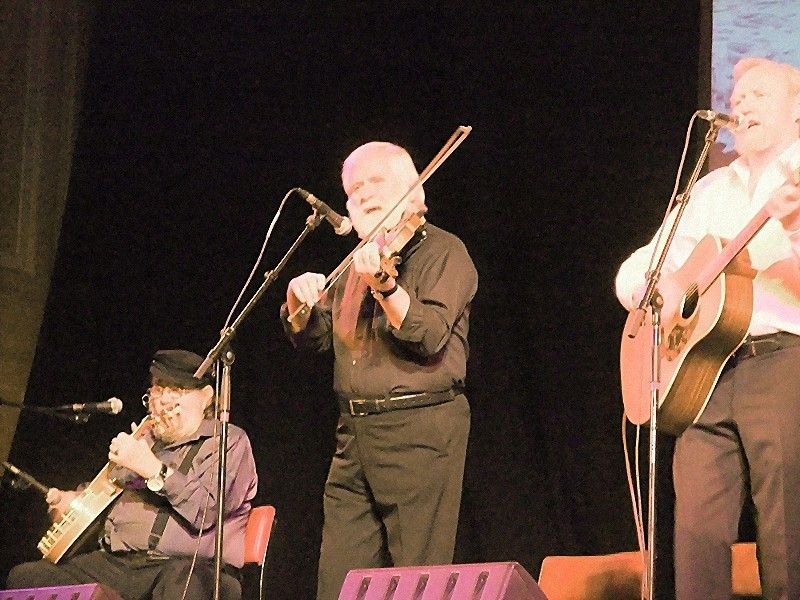
In
2008 the "Bridge Folk Club" celebrated its 50th anniversary with
a big birthday party which was filmed and recorded live. Among the
musicians who appeared that evening to commemorate five decades of folk
music in Newcastle were of course its two founder members. But there were
also many other guest artists and visitors and friends present who had in
one way or another been connected to the folk club since its early days. I
venture to say that, sadly, at least one person was missing that night.
A
leap in time ... March 2010, The Dubliners UK Tour ... A Time To Remember.
Certainly no coincidence that one station of this memorable tour should be
in Newcastle, that city that had made such a vital and lasting impression
on Luke Kelly and had marked a turning point in his life almost exactly 50
years before. In his introduction to their commemoration of Luke, John
Sheahan spoke about this association to Newcastle, recalling that Luke had
lived there for a while in the 60's. Barney elaborated on this later in
the evening, explaining that Luke had worked and sung in Newcastle's
hotels and bars, and alluding to his connection to "The Ranters"
and "The Bridge". And he put it in a nutshell as he expressed
Luke's relationship to the City of Newcastle: "This was Luke's place!"
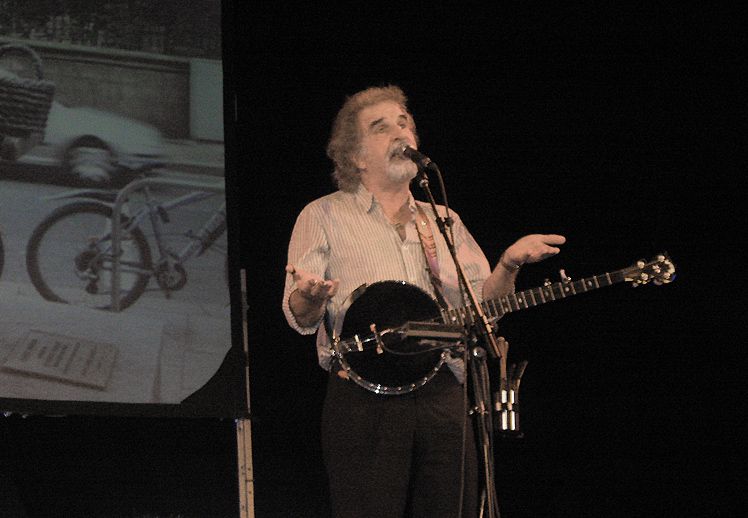
With
the exception of these short retrospections of a time before The
Dubliners, the concert in Newcastle followed the familiar pattern of other
A Time To Remember gigs – songs and tunes out of 48 years of Dubliners'
repertoire (John: "only 2 to the 50 and no plans to stop yet!")
complemented on screen by pictures mostly from the early days, and spiced
with poetry, tape recordings and video clips to commemorate those who had
passed away. Several years have elapsed since The Dubliners' last
appearance in Tyneside, the City Hall was packed, and the 2000
enthusiastic fans accompanied the five on stage from the opening reels to
the final encore with clapping, singing and foot stamping. And although it
was my second A Time To Remember it was nevertheless for two reasons a new
and exciting experience. One factor was indeed this same Newcastle
audience – it was fascinating to be sitting again in the midst of native
English speakers, who not only enjoyed immensely old favourites like
Sean's "Rocky Road To Dublin" and "Black Velvet Band",
Patsy's "All For Me Grog" and "Dirty Old Town" and
manifested great pleasure in accompanying the two videos of the evening,
"Maids When You're Young" and "McAlpine's Fusiliers",
but were also undoubtedly at an advantage when it came to joining in on
the chorus of less familiar songs in the Time To Remember set list. And
furthermore were inherently capable of appreciating to the full the
humorous anecdotes related during the evening and the subtleties of John
Sheahan's wonderful poetry!
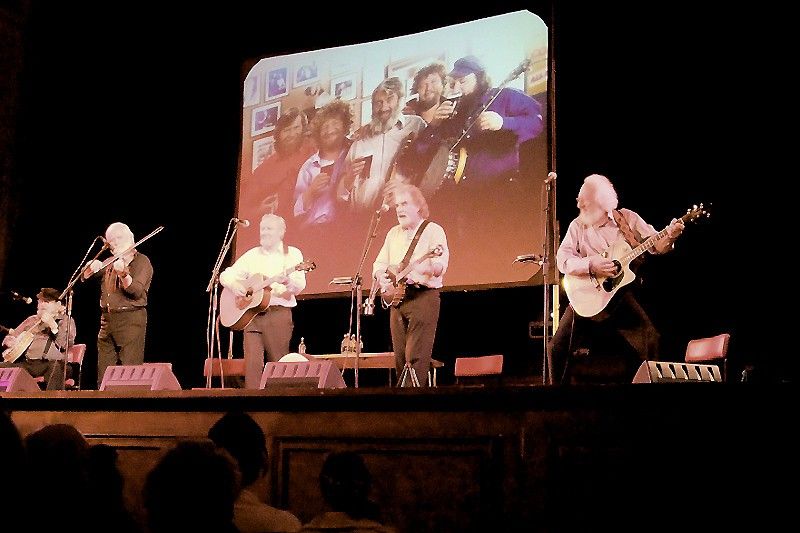
But
first and foremost, my having been a witness in Wadern of an extraordinary
Time To Remember concert without John Sheahan, it was a special pleasure
to see and hear him again, to listen to his fiddle and tin whistle, and to
watch him as he recited, quite obviously deeply moved, his tribute poems
"Luke's Gravestone", "Remembering Ciaran Bourke" and
"Ronnie's Heaven". It was also John who was responsible for one
of my musical highlights of the evening, "St.Patrick's Cathedral",
undoubtedly one of my long-time favourites from his original compositions.
I found it especially emotive to watch him, accompanied by "his
younger friend Eamonn", playing it quasi in front of the magnificent
building that had inspired him.
Sean
and Patsy were in excellent singing form in Newcastle and treated us in
the course of the concert to a wide variety of great songs. I must admit
that secretly I had been hoping to hear Sean with some speciality from the
North-East's musical heritage, and had already imagined him makíng a
fantastic job of – what else? – "Keep Your Feet Still Geordie
Hinny"! But apart from the fact that it would have probably been
somewhat out of place in the theme of the evening, I suppose it is also a
pretty unrealistic request to the visitors of any Dubliners' gig, whether
in Newcastle or elsewhere! Needless to say, there were certainly no feet
still in the City Hall as Sean told us the tale of "Kelly The Boy
From Killane" or later sang the praises of "The Rare Ould
Mountain Dew"!
Patsy,
never failing to confess his admiration for his "idol" Luke
Kelly, gave us a wonderful rendition of "The Nightingale", a
song that I not only associate with the Dubliners' first album but which
also inevitably conjures up memories of my own folk club days of long ago.
Another integral part of the Time To Remember set list is Patsy's
lamentation of the changes in a beloved town – in Wadern he sang of Phil
Coulter's much-loved Derry, in Newcastle it was time again to remember his
own Dublin City in the "Rare Auld Times".
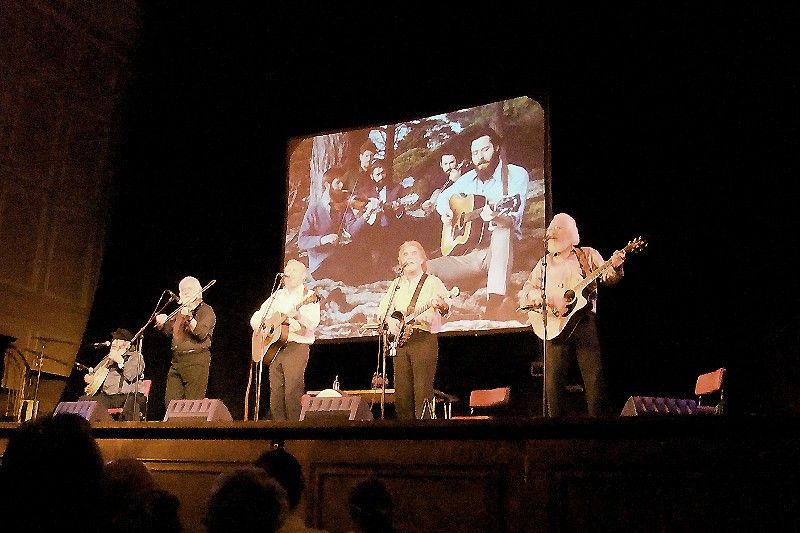
Barney
McKenna has played and sung himself into the hearts of so many people in
so many corners of the world, but, judging by the vehemence of his
reception in the City Hall, Tyneside is a stronghold of his fans!
Nevertheless, Barney always being good for a surprise, his first song was
not "Three Score And Ten" which because of Newcastle's proximity
to the North Sea one might have expected; instead he heaved and hauled us
away to "South Australia", a sea trip which was visibly and
audibly enjoyed by all! But yet another surprise awaited the visitors in
Newcastle. Shortly before the interval John, Sean and Patsy disappeared to
put the kettle on, (although it remained a secret why they needed hot
water at all for Newcastle's national beverage which Patsy was later so
full of praise of!) leaving Barney and Eamonn to entertain us with what
was apparently a special bonbon for all visitors of the UK tour – Barney
laid aside his beloved banjo for a while and delighted the audience with a
couple of tunes on the melodeon! True to the nickname John has often given
him, "Romeo" McKenna played for us first a few bars of "True
Love", made immortal by Grace Kelly and Bing Crosby in "High
Society", following on with the lively Irish hornpipe "Harvest
Home". The kettle hadn't come to the boil yet, so there was still
enough time for Eamonn's much-loved "Maid Behind The Bar" and
another special "McKenna treat". It was a traditional Irish
tune, and he described it as "a song about emigration", but when
Barney's banjo plays "The Old House" there are no lyrics
necessary to convey this poignant feeling of sadness and longing for
by-gone days and places.
Newcastle
upon Tyne – an evening full of highlights and an audience full of
appreciation for them. But for me there was one song that stood out above
all others. A song I have heard so often, both live and recorded, and
which never fails to fascinate me, but in Newcastle seemed to gain new and
special significance. And as The Dubliners raised the roof of the City
Hall with "The Auld Triangle", I was taken back in time to that
folk club 50 years ago, just around the corner from where I was sitting
now, and I saw in my thoughts that red-haired Irish lad as he entered
those rooms and, hearing the very same song that I was hearing now, lost
his heart to folk music.
Acknowledgements:
Luke Kelly A Memoir. Des Geraghty 1994
Special thanks to Johnny Handle and the present organiser of the Bridge
Folk Club, Dave Minikin, for their very kind support.
Article
by Enid
Concert photographs (c) Helmut except: Photograph #4 (c) Polly
Backstage shot of Polly with her husband and Sean (c) Polly
Backstage shot of Enid and
Patsy (c) Helmut
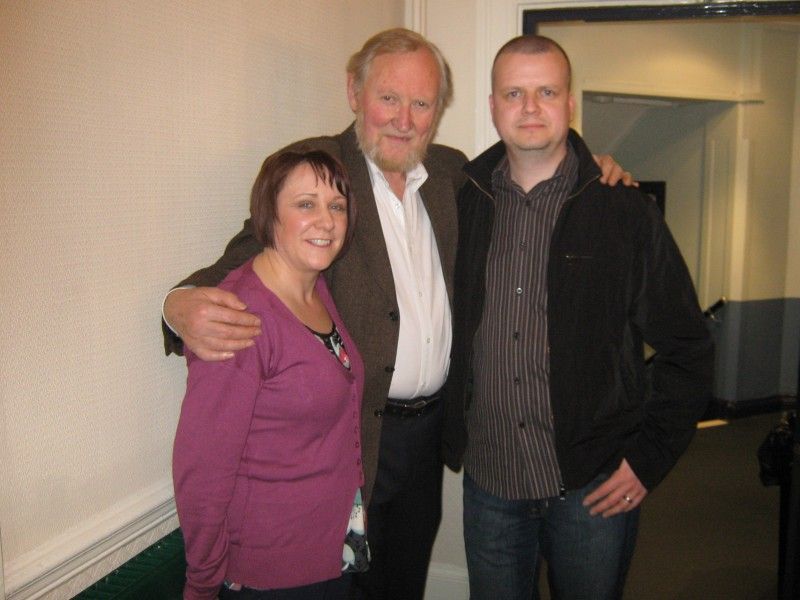
Polly
& her husband with Sean

Enid
& Patsy
See even more pictures in our 2010
gallery!
|
